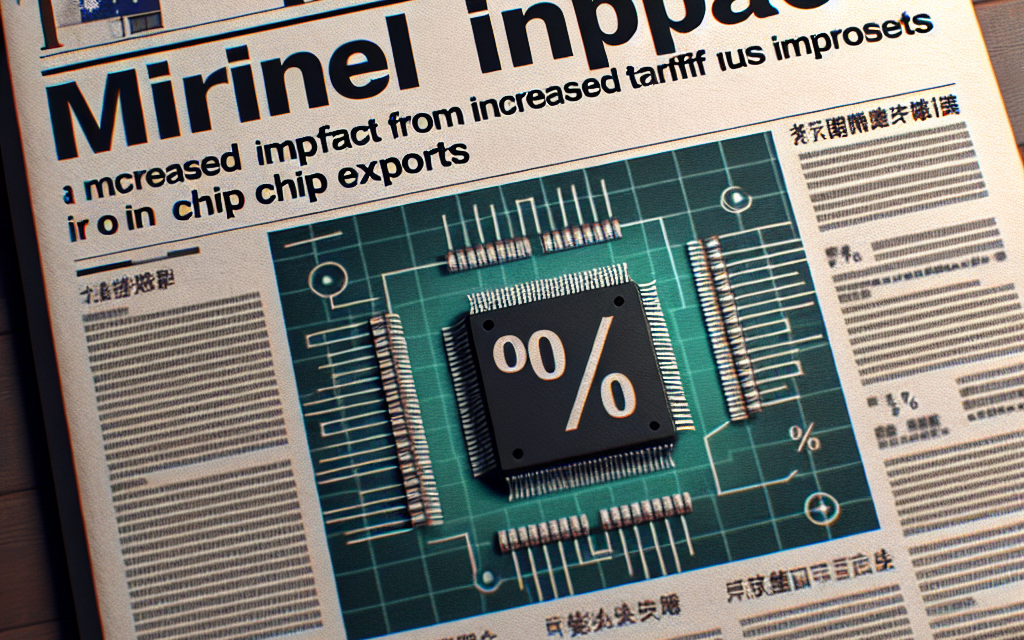“Taiwan’s Chip Industry Braces for Trump Tariffs: Minimal Impact Expected.”
Introduction
Taiwan’s semiconductor industry is poised to navigate the challenges posed by the tariffs implemented during Donald Trump’s presidency with minimal disruption. As a global leader in chip manufacturing, Taiwan’s companies, particularly Taiwan Semiconductor Manufacturing Company (TSMC), have strategically positioned themselves to mitigate the impact of trade tensions. With a robust supply chain and a diverse customer base, Taiwan anticipates that the tariffs will have limited effects on its chip exports, allowing it to maintain its competitive edge in the rapidly evolving technology landscape. This resilience underscores Taiwan’s critical role in the global semiconductor market and its ability to adapt to shifting geopolitical dynamics.
Taiwan’s Semiconductor Industry Resilience
Taiwan’s semiconductor industry has long been recognized as a cornerstone of the global technology supply chain, and recent developments suggest that it is poised to maintain its resilience in the face of external pressures, including potential tariffs imposed by the Trump administration. As the United States continues to navigate its trade policies, particularly concerning China, Taiwan’s semiconductor sector appears to be well-equipped to weather these challenges. This resilience can be attributed to several factors, including the industry’s robust infrastructure, strategic partnerships, and a commitment to innovation.
One of the primary reasons for Taiwan’s semiconductor industry’s resilience is its advanced manufacturing capabilities. Companies such as Taiwan Semiconductor Manufacturing Company (TSMC) have established themselves as leaders in the field, consistently pushing the boundaries of technology and production efficiency. TSMC’s ability to produce cutting-edge chips at scale has not only solidified its position in the market but has also made it a critical supplier for major global technology firms. This strong manufacturing base allows Taiwan to remain competitive, even in the face of potential tariffs that could affect pricing and market access.
Moreover, Taiwan’s semiconductor industry benefits from a well-established ecosystem that includes a network of suppliers, research institutions, and skilled labor. This interconnected framework fosters collaboration and innovation, enabling companies to adapt quickly to changing market conditions. For instance, the ongoing development of next-generation technologies, such as artificial intelligence and 5G, has created new opportunities for growth within the sector. As these technologies continue to evolve, Taiwan’s semiconductor firms are well-positioned to capitalize on emerging trends, thereby mitigating the potential impact of tariffs on their export activities.
In addition to its manufacturing prowess, Taiwan’s semiconductor industry has cultivated strong relationships with key international partners. These partnerships are crucial for maintaining access to global markets and ensuring a steady flow of resources and expertise. For example, collaborations with American technology companies have not only bolstered Taiwan’s position in the semiconductor supply chain but have also facilitated knowledge transfer and innovation. As a result, even if tariffs were to be implemented, the existing relationships and interdependencies between Taiwanese firms and their international counterparts could help cushion the blow, allowing for continued growth and stability.
Furthermore, Taiwan’s government has demonstrated a proactive approach to supporting its semiconductor industry. By investing in research and development, as well as providing incentives for companies to innovate, the government has created an environment conducive to growth. This commitment to fostering a competitive landscape ensures that Taiwanese firms remain at the forefront of technological advancements, which is essential for maintaining their global market share. As the industry continues to evolve, these government initiatives will play a vital role in sustaining resilience against external pressures, including tariffs.
In conclusion, while the potential for tariffs imposed by the Trump administration may raise concerns for some sectors, Taiwan’s semiconductor industry is likely to experience minimal effects due to its inherent strengths. The combination of advanced manufacturing capabilities, a robust ecosystem, strategic international partnerships, and supportive government policies positions Taiwan to navigate the complexities of the global market effectively. As the semiconductor landscape continues to shift, Taiwan’s ability to adapt and innovate will be crucial in ensuring its ongoing success and resilience in the face of external challenges.
Impact of Trump Tariffs on Global Chip Markets
As the global semiconductor industry continues to navigate the complexities of international trade, the anticipated impact of former President Donald Trump’s tariffs on chip exports has become a focal point for many stakeholders, particularly in Taiwan. The island nation, renowned for its advanced semiconductor manufacturing capabilities, is poised to experience minimal disruption from these tariffs, primarily due to its strategic positioning within the global supply chain. This resilience can be attributed to several factors, including Taiwan’s established relationships with key technology firms and its ability to adapt to shifting market dynamics.
To begin with, Taiwan’s semiconductor industry is characterized by its robust infrastructure and technological prowess, which have allowed it to maintain a competitive edge in the global market. Companies such as Taiwan Semiconductor Manufacturing Company (TSMC) play a pivotal role in this landscape, providing essential services to a diverse array of clients, including major players in the United States. As a result, the tariffs imposed by the Trump administration are unlikely to significantly hinder Taiwan’s chip exports, as many of these exports are integral to the operations of American technology firms. This interdependence suggests that U.S. companies may seek to mitigate the effects of tariffs by continuing to source chips from Taiwan, thereby ensuring a steady flow of products despite the trade barriers.
Moreover, the global semiconductor market is inherently dynamic, with demand for chips consistently on the rise due to the proliferation of technology across various sectors. From consumer electronics to automotive applications, the need for advanced semiconductors is expected to grow, which bodes well for Taiwan’s export outlook. In this context, the tariffs may inadvertently create opportunities for Taiwanese manufacturers to capture a larger share of the market, as companies look for reliable suppliers that can meet their increasing demands. Consequently, while tariffs may pose challenges, they also present avenues for growth and expansion within the industry.
In addition to these market dynamics, Taiwan’s government has been proactive in fostering a favorable business environment for semiconductor companies. By investing in research and development, as well as incentivizing innovation, Taiwan is positioning itself as a leader in the global chip market. This commitment to advancement not only enhances the competitiveness of Taiwanese firms but also serves to attract foreign investment, further solidifying the island’s role as a critical player in the semiconductor supply chain. As such, the potential impact of tariffs on Taiwan’s chip exports may be mitigated by the country’s ongoing efforts to enhance its technological capabilities and maintain its status as a preferred supplier.
Furthermore, the geopolitical landscape surrounding Taiwan and its semiconductor industry cannot be overlooked. As tensions between the United States and China continue to escalate, the importance of securing reliable sources of semiconductors has become increasingly apparent. In this regard, Taiwan’s strategic location and established manufacturing expertise make it an indispensable partner for U.S. companies seeking to navigate the complexities of global trade. This reliance on Taiwanese chips may further insulate the island from the adverse effects of tariffs, as American firms prioritize maintaining their supply chains in the face of uncertainty.
In conclusion, while the Trump tariffs may introduce some challenges to the global chip markets, Taiwan is well-positioned to weather these changes with minimal impact on its exports. The island’s strong manufacturing capabilities, coupled with its strategic relationships and proactive government policies, suggest that Taiwan will continue to thrive in the semiconductor industry, even amidst the shifting tides of international trade. As the global demand for chips continues to grow, Taiwan’s resilience and adaptability will likely serve as key factors in its ongoing success.
Taiwan’s Trade Relations with the U.S.
Taiwan’s trade relations with the United States have long been characterized by a complex interplay of economic interests, geopolitical considerations, and technological advancements. As a key player in the global semiconductor industry, Taiwan has established itself as a critical supplier of chips, which are essential components in a wide array of electronic devices. The recent imposition of tariffs by the Trump administration raised concerns about potential disruptions in trade dynamics, particularly in the technology sector. However, Taiwan’s government and industry experts anticipate that the impact of these tariffs on chip exports will be minimal, primarily due to the unique position Taiwan holds in the global supply chain.
To begin with, it is essential to recognize that Taiwan’s semiconductor industry is not only robust but also highly integrated into the global market. Major companies such as Taiwan Semiconductor Manufacturing Company (TSMC) play a pivotal role in supplying chips to leading technology firms in the United States, including Apple, NVIDIA, and Qualcomm. This interdependence creates a scenario where any significant disruption in trade could have far-reaching consequences for both economies. Consequently, Taiwan’s government has been proactive in engaging with U.S. officials to ensure that trade relations remain stable and beneficial for both parties.
Moreover, the nature of the semiconductor market further mitigates the potential impact of tariffs. Unlike traditional goods, semiconductors are often subject to complex pricing structures and long-term contracts that can buffer against sudden changes in trade policy. As a result, many U.S. companies have already established strong relationships with Taiwanese suppliers, which can help to insulate them from the immediate effects of tariffs. This established rapport allows for a degree of flexibility and adaptability, enabling both sides to navigate the challenges posed by changing trade policies.
In addition to these factors, Taiwan’s strategic importance in the global technology landscape cannot be overstated. The island’s advanced manufacturing capabilities and expertise in semiconductor production make it an indispensable partner for U.S. technology firms. As the demand for chips continues to surge, particularly with the rise of artificial intelligence and the Internet of Things, Taiwan’s role as a supplier is likely to become even more critical. This growing demand may further diminish the potential impact of tariffs, as U.S. companies may prioritize maintaining their supply chains over the costs associated with additional tariffs.
Furthermore, Taiwan’s government has been actively seeking to diversify its trade relationships beyond the United States. By strengthening ties with other countries and regions, such as the European Union and Southeast Asia, Taiwan aims to reduce its reliance on any single market. This diversification strategy not only enhances Taiwan’s economic resilience but also positions it as a key player in the broader global supply chain. As a result, even in the face of tariffs, Taiwan’s chip exports are likely to remain stable, supported by a diverse array of international partnerships.
In conclusion, while the Trump administration’s tariffs initially raised concerns about their potential impact on Taiwan’s chip exports, the reality is that the effects are expected to be minimal. Taiwan’s strong trade relations with the United States, coupled with its strategic importance in the semiconductor industry and efforts to diversify its trade partnerships, create a favorable environment for continued growth. As the global demand for chips continues to rise, Taiwan is well-positioned to navigate the complexities of international trade, ensuring that its vital role in the technology sector remains intact.
Strategies for Taiwanese Chip Manufacturers
As Taiwan navigates the complexities of international trade, particularly in the semiconductor sector, Taiwanese chip manufacturers are adopting a range of strategies to mitigate the potential impacts of tariffs imposed by the Trump administration. While the anticipated effects of these tariffs on chip exports may be minimal, the proactive measures being implemented by these companies reflect a keen awareness of the evolving geopolitical landscape and the need for resilience in a highly competitive market.
One of the primary strategies employed by Taiwanese chip manufacturers is diversification. By expanding their customer base beyond traditional markets, these companies are less vulnerable to fluctuations in demand resulting from tariffs. This diversification not only involves seeking new clients in different regions but also encompasses the development of a broader product portfolio. By investing in research and development, Taiwanese firms are enhancing their capabilities to produce a wider array of semiconductor products, thereby appealing to various industries, including automotive, consumer electronics, and telecommunications. This strategic pivot allows manufacturers to cushion the impact of any potential downturns in specific markets.
In addition to diversification, Taiwanese chip manufacturers are also focusing on strengthening their supply chains. The semiconductor industry is characterized by its intricate and often global supply chains, which can be disrupted by tariffs and trade tensions. To counteract this vulnerability, companies are investing in localizing certain aspects of their supply chains. By establishing partnerships with local suppliers and increasing domestic production capabilities, manufacturers can reduce their reliance on foreign components that may be subject to tariffs. This not only enhances supply chain resilience but also aligns with broader trends toward regionalization in manufacturing.
Moreover, Taiwanese chip manufacturers are leveraging their technological expertise to maintain a competitive edge. The semiconductor industry is driven by rapid technological advancements, and companies that can innovate effectively are better positioned to thrive despite external pressures. By prioritizing investment in cutting-edge technologies, such as artificial intelligence and 5G, Taiwanese firms are not only enhancing their product offerings but also solidifying their status as leaders in the global semiconductor market. This focus on innovation serves as a buffer against the potential adverse effects of tariffs, as high-quality, advanced products often command premium prices and can attract a loyal customer base.
Furthermore, collaboration with international partners is another key strategy that Taiwanese chip manufacturers are employing. By fostering strategic alliances with firms in other countries, these manufacturers can share resources, knowledge, and technology, thereby enhancing their competitive position. Such collaborations can also facilitate access to new markets, allowing Taiwanese companies to offset any losses incurred due to tariffs. This approach underscores the importance of maintaining strong relationships within the global semiconductor ecosystem, which is essential for navigating the complexities of international trade.
In conclusion, while the Trump tariffs may pose challenges for Taiwanese chip manufacturers, the strategies they are implementing—diversification, supply chain localization, technological innovation, and international collaboration—are designed to minimize potential impacts. By adopting a proactive stance and remaining agile in the face of changing market dynamics, these companies are not only safeguarding their interests but also reinforcing Taiwan’s position as a critical player in the global semiconductor industry. As the landscape continues to evolve, the resilience and adaptability of Taiwanese chip manufacturers will be crucial in ensuring their sustained success.
Future of Taiwan’s Tech Exports Amid Tariffs
As Taiwan navigates the complex landscape of international trade, particularly in the technology sector, the anticipated minimal effect of Trump-era tariffs on its chip exports emerges as a focal point of discussion. The semiconductor industry, a cornerstone of Taiwan’s economy, has long been recognized for its critical role in global supply chains. With the United States imposing tariffs on various goods, including technology products, concerns have arisen regarding the potential impact on Taiwan’s exports. However, industry experts and analysts suggest that the repercussions may not be as severe as initially feared.
One of the primary reasons for this optimism lies in Taiwan’s established position as a leading semiconductor manufacturer. Companies such as Taiwan Semiconductor Manufacturing Company (TSMC) have built a robust reputation for producing high-quality chips that are essential for a wide range of applications, from consumer electronics to advanced computing systems. As a result, the demand for Taiwanese chips remains strong, even in the face of tariffs. This sustained demand is bolstered by the global shift towards digitalization and the increasing reliance on technology across various sectors, which further mitigates the potential adverse effects of tariffs.
Moreover, Taiwan’s strategic partnerships with major technology firms in the United States and other countries play a crucial role in maintaining its export levels. Many American companies rely heavily on Taiwanese semiconductors to power their products, creating a symbiotic relationship that is difficult to disrupt. This interdependence suggests that while tariffs may introduce additional costs, the overall impact on trade dynamics could be limited. In fact, some analysts argue that U.S. companies may absorb these costs rather than risk losing access to high-quality Taiwanese chips, thereby preserving the flow of exports.
In addition to the strong demand and strategic partnerships, Taiwan’s government has taken proactive measures to bolster its semiconductor industry. Initiatives aimed at enhancing research and development, as well as investments in advanced manufacturing technologies, are designed to ensure that Taiwan remains at the forefront of the global semiconductor market. By fostering innovation and maintaining high production standards, Taiwan is well-positioned to navigate the challenges posed by tariffs and other trade barriers.
Furthermore, the geopolitical landscape surrounding Taiwan adds another layer of complexity to the discussion. As tensions between the United States and China continue to evolve, Taiwan’s role as a key player in the semiconductor supply chain becomes increasingly significant. The U.S. government has expressed a desire to reduce its reliance on Chinese technology, which may inadvertently benefit Taiwan. As American companies seek alternative sources for semiconductors, Taiwan’s established infrastructure and expertise could make it an attractive option, further insulating its exports from the effects of tariffs.
In conclusion, while the imposition of tariffs during the Trump administration raised concerns about the future of Taiwan’s tech exports, the anticipated minimal impact reflects a combination of strong demand, strategic partnerships, proactive government initiatives, and the evolving geopolitical landscape. As Taiwan continues to solidify its position as a leader in semiconductor manufacturing, it is likely to weather the storm of tariffs with resilience. The interplay of these factors suggests that Taiwan’s tech exports will not only endure but may also thrive in the face of challenges, ensuring the island’s continued prominence in the global technology arena.
Economic Outlook for Taiwan’s Semiconductor Sector
Taiwan’s semiconductor sector, a cornerstone of its economy, is poised to navigate the complexities of international trade dynamics with a sense of resilience, particularly in light of the anticipated minimal impact from potential tariffs imposed by former President Donald Trump. As the global demand for semiconductors continues to surge, Taiwan’s semiconductor industry, led by giants such as Taiwan Semiconductor Manufacturing Company (TSMC), remains well-positioned to maintain its competitive edge. This outlook is bolstered by the strategic importance of semiconductors in various sectors, including consumer electronics, automotive, and telecommunications, which are increasingly reliant on advanced chip technology.
The semiconductor industry in Taiwan has long been recognized for its innovation and efficiency, attributes that have allowed it to thrive even amidst geopolitical tensions. While the prospect of tariffs could create challenges for some sectors, the overall sentiment within Taiwan’s semiconductor industry is one of cautious optimism. This is largely due to the fact that many of Taiwan’s semiconductor exports are directed towards markets that are less susceptible to tariff fluctuations, such as the United States and various countries in Asia. Consequently, the anticipated tariffs may not significantly disrupt the established supply chains that have been meticulously developed over the years.
Moreover, Taiwan’s semiconductor firms have demonstrated a remarkable ability to adapt to changing market conditions. For instance, the ongoing global chip shortage has underscored the critical role that Taiwan plays in the semiconductor supply chain. As companies worldwide scramble to secure chip supplies, Taiwan’s manufacturers have ramped up production capabilities, thereby reinforcing their position as indispensable players in the global market. This adaptability not only mitigates the potential adverse effects of tariffs but also enhances Taiwan’s reputation as a reliable supplier.
In addition to the immediate economic implications, the long-term outlook for Taiwan’s semiconductor sector remains promising. The Taiwanese government has recognized the strategic importance of this industry and has implemented policies aimed at fostering innovation and investment. Initiatives such as tax incentives for research and development, as well as support for emerging technologies like artificial intelligence and 5G, are designed to ensure that Taiwan remains at the forefront of semiconductor advancements. These efforts are expected to yield dividends in the form of increased competitiveness and market share, further insulating the sector from external shocks.
Furthermore, the global shift towards digitalization and the Internet of Things (IoT) is likely to drive sustained demand for semiconductors. As industries increasingly integrate smart technologies into their operations, the need for advanced chips will only grow. Taiwan’s semiconductor companies are well-equipped to meet this demand, given their expertise in producing cutting-edge technology. This alignment with global trends positions Taiwan favorably, allowing it to capitalize on emerging opportunities while minimizing the risks associated with tariff-related disruptions.
In conclusion, while the potential for tariffs under Trump’s administration may raise concerns, Taiwan’s semiconductor sector is expected to experience minimal adverse effects. The combination of a robust supply chain, government support, and a forward-looking approach to innovation will enable Taiwan to navigate the complexities of the global market effectively. As the world continues to evolve technologically, Taiwan’s semiconductor industry stands ready to play a pivotal role, ensuring that it remains a vital contributor to both the local and global economy.
Comparison of Tariff Effects on Taiwan vs. Other Countries
As the global economy continues to grapple with the implications of trade policies, Taiwan stands out as a unique case in the context of the tariffs imposed by former President Donald Trump. While many countries have felt the brunt of these tariffs, particularly those heavily reliant on exports to the United States, Taiwan’s semiconductor industry appears to be relatively insulated from the adverse effects. This resilience can be attributed to several factors that differentiate Taiwan’s economic landscape from that of other nations.
To begin with, Taiwan’s semiconductor sector is a cornerstone of its economy, contributing significantly to its GDP and employment. The island is home to some of the world’s leading chip manufacturers, such as Taiwan Semiconductor Manufacturing Company (TSMC), which plays a pivotal role in the global supply chain. Unlike countries that primarily export raw materials or lower-value goods, Taiwan’s focus on high-tech products positions it favorably in the face of tariffs. The advanced nature of its semiconductor exports means that they are less susceptible to the price increases that tariffs typically impose on consumer goods. Consequently, while other nations may experience a decline in export volumes due to increased costs, Taiwan’s high-value chips maintain their competitiveness in the market.
Moreover, the strategic importance of semiconductors in the global economy cannot be overstated. As countries around the world strive to enhance their technological capabilities, the demand for advanced chips continues to rise. This demand creates a buffer for Taiwan against the potential fallout from tariffs. In contrast, countries that rely on traditional manufacturing or commodity exports may find themselves at a disadvantage, as their products become less appealing in the face of increased costs. Thus, while tariffs may disrupt trade flows for many nations, Taiwan’s position as a leader in semiconductor technology allows it to navigate these challenges with relative ease.
Additionally, Taiwan’s trade relationships further mitigate the impact of U.S. tariffs. The island has cultivated strong ties with various countries, particularly in Asia, which allows it to diversify its export markets. This diversification is crucial, as it reduces reliance on any single market, including the United States. In contrast, countries that are heavily dependent on U.S. exports may find themselves more vulnerable to the fluctuations caused by tariff policies. By maintaining a broad network of trade partners, Taiwan can offset potential losses from U.S. tariffs by increasing exports to other regions, thereby ensuring a more stable economic outlook.
Furthermore, the Taiwanese government has been proactive in addressing the challenges posed by global trade dynamics. By investing in research and development, as well as fostering innovation within the semiconductor sector, Taiwan is positioning itself to remain competitive in an ever-evolving market. This forward-thinking approach contrasts sharply with the strategies employed by some other nations, which may struggle to adapt to the rapid changes in global trade policies.
In conclusion, while the Trump administration’s tariffs have had significant repercussions for many countries, Taiwan’s semiconductor industry appears to be largely unaffected. The combination of high-value exports, strategic trade relationships, and a commitment to innovation has enabled Taiwan to weather the storm of tariffs more effectively than its counterparts. As the global economy continues to evolve, Taiwan’s ability to maintain its competitive edge in the semiconductor market will be crucial in navigating future trade challenges.
Q&A
1. **Question:** What is the primary concern regarding Trump tariffs for Taiwan’s chip exports?
**Answer:** The primary concern is that tariffs could increase costs for Taiwanese semiconductor manufacturers and affect their competitiveness in the global market.
2. **Question:** How does Taiwan’s semiconductor industry view the potential impact of these tariffs?
**Answer:** Taiwan’s semiconductor industry anticipates minimal impact from the tariffs due to its established relationships and contracts with major clients.
3. **Question:** What factors contribute to Taiwan’s confidence in its chip export stability despite tariffs?
**Answer:** Factors include the high demand for semiconductors, Taiwan’s technological leadership, and the strategic importance of its chips in global supply chains.
4. **Question:** Which major companies are involved in Taiwan’s semiconductor exports?
**Answer:** Major companies include Taiwan Semiconductor Manufacturing Company (TSMC) and MediaTek.
5. **Question:** How might the tariffs affect U.S. companies that rely on Taiwanese chips?
**Answer:** U.S. companies may face increased costs and potential supply chain disruptions, but they are likely to seek alternative solutions to mitigate these effects.
6. **Question:** What is the broader economic context influencing Taiwan’s chip exports?
**Answer:** The ongoing global semiconductor shortage and geopolitical tensions in the Asia-Pacific region are influencing Taiwan’s chip exports.
7. **Question:** What strategies might Taiwan employ to maintain its chip export levels amid tariffs?
**Answer:** Taiwan may focus on diversifying its markets, enhancing production efficiency, and investing in research and development to stay competitive.
Conclusion
Taiwan anticipates that the impact of Trump-era tariffs on its semiconductor exports will be minimal, as the island’s chip industry is well-positioned to adapt to changing trade dynamics. The strong global demand for semiconductors, coupled with Taiwan’s technological advancements and established supply chains, is likely to mitigate any adverse effects from tariffs. Additionally, Taiwan’s strategic partnerships and diversification of markets further enhance its resilience against potential trade disruptions.





